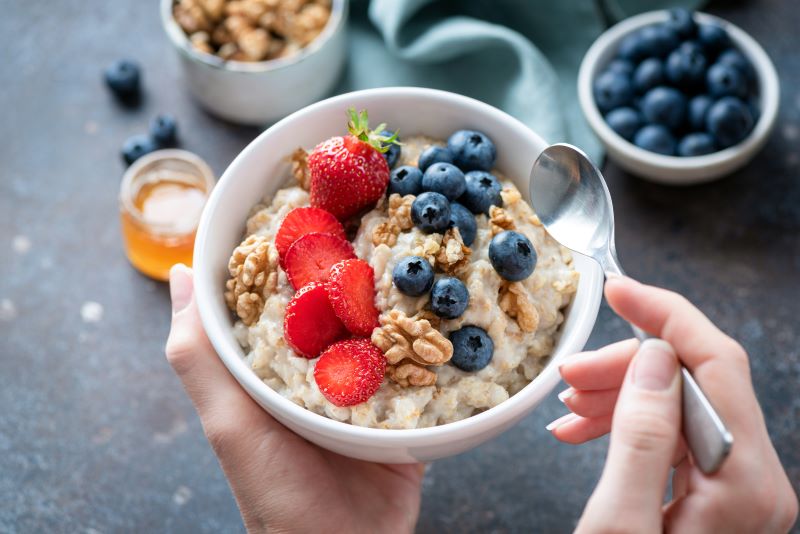
Fiber is a carbohydrate that cannot be digested or turned into sugar. Found in fruits, vegetables, legumes, and whole grains, fiber has numerous health benefits and reduces your risk for certain diseases, including obesity, heart disease, diabetes, and cancer.

Taylor Stein, RD
In this Q&A, Taylor Stein, MS, RD, CDN, Associate Researcher and Registered Dietitian at The Charles Bronfman Institute for Personalized Medicine, Icahn School of Medicine at Mount Sinai, explains the importance of fiber and how to get more of it in your diet.
Why is fiber beneficial?
Fiber feeds the bacteria in your digestive system that improve overall gut health, which in turn benefits your heart and immune system health. Additionally, fiber helps move stool through your colon, preventing constipation. Fiber is associated with decreased risk of heart disease by lowering the “bad” cholesterol, known as LDL cholesterol, which contributes to plaque buildup in the arteries. It also reduces your risk for colon cancer.
Can eating more fiber help me lose weight?
Yes. Plant-based foods like fruits and vegetables tend to be high in fiber and nutrition and low in calories. They make you feel full without having to eat many calories. For example, a cup of broccoli florets has about two-and-a-half grams of fiber and only 31 calories. In comparison, a slice of white bread could contain about 1 gram of fiber (depending on the size) and more than 100 calories.
Fiber also helps you feel full by slowing down digestion, which helps manage blood sugar and reduces your risk for developing diabetes.
How much fiber is recommended every day?
Women under 50 should have 25 grams per day or more; women over 50 should have 21 grams per day. Men younger than 50 should have 38 grams per day; men over 50 should have 30 grams per day. However, your fiber needs will vary based on your lifestyle—for example, people who exercise eat more on average. Generally, you should eat about 14 grams of fiber per 1,000 calories.
How can I know if I’m not getting enough fiber?
If you are constipated or not having regular bowel movements, experiencing diarrhea, or your cholesterol is high, you might not be getting enough fiber.
What are the risks of eating too much fiber?
Too much fiber can cause stomach upset, including bloating and gas. If you plan to increase your fiber, it’s a good idea to start slowly, while increasing water intake. Be sure to check nutritional labels—some products may contain more fiber than your body needs.
What is the difference between soluble and insoluble fiber?
While both types draw water into your intestines, soluble fiber dissolves and forms a gel-like substance while insoluble fiber makes stool bulky. Both help stool move through your digestive system and have unique health benefits.
Does it matter how much soluble versus insoluble fiber I eat?
Generally, you should get a variety. Most fruits and vegetables have a combination of soluble and insoluble fiber. Whether you should eat more of one versus the other depends. For example, if you have high cholesterol, you may benefit from eating more foods high in soluble fiber (oats, apples, bananas, avocado, beans). If you are constipated, eating more insoluble fiber (berries, leafy greens, nuts and seeds, beans) and increasing water intake will help.
What are some easy ways to get more fiber?
Include lots of plant-based foods—fruits, vegetables, whole grains, legumes—in every meal, and replace processed snacks, like chips, with whole foods, or foods without artificial ingredients and additives and are minimally processed. If you do purchase processed food, choose products that contain some fiber.
Does blending fruits and vegetables for smoothies mean I get less fiber than if I eat them without any processing?
No, the same amount of fiber is still there, but in smaller pieces. However, you may feel less full than if you eat whole foods.
Are fiber supplements beneficial?
The fiber in whole foods is superior to fiber supplements. While whole foods contain both soluble and insoluble fiber, most supplements only contain one type of fiber, and some have added sugar.
Generally, fiber supplements are beneficial for people with certain medical conditions, but these people may still need to get fiber from foods. Add an extra serving of seeds or half a cup of fruit at snack time.
What else should people know?
Some people should speak to their physician about whether they should limit fiber intake. This includes:
- People with certain medical conditions, such as irritable bowel syndrome, Crohn’s disease, ulcerative colitis
- People undergoing cancer treatment
- People staring new medications or preparing for surgery.
